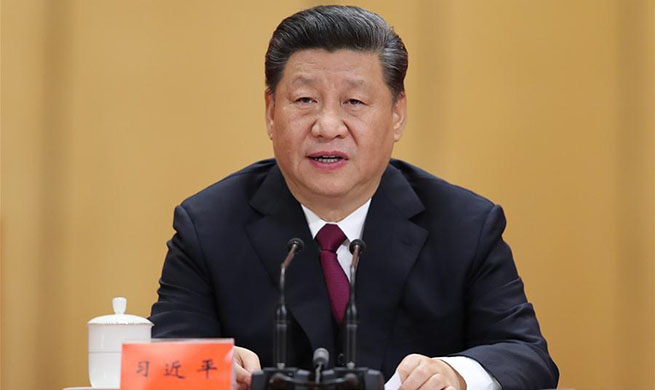SAN FRANCISCO, May 2 (Xinhua) -- The United States and China are two powerful countries that enjoy significant clout in technological innovation, and have a lot of influence on the rest of world, Steven Hoffman, CEO of Founder Space, said Thursday.
Hoffman, who delivered a keynote speech at the 2019 Silicon Valley Entrepreneurs Festival (SVEF) that was held Thursday in Santa Clara, Northern California, said both China and the United States are leading the world in innovation.
"China and the U.S. are leading innovation in the world. Where China and the U.S. go, the rest of the world will follow," said Hoffman, who told Xinhua about his close connections with many Chinese enterprises and companies in China, where he advised on innovation programs to help his Chinese partners understand where they are headed in the future.
"China and the U.S. are also really pushing where we go with new gene editing technology like CRISPR, or Clustered Regularly Interspaced Short Palindromic Repeats, and both countries are on the forefront of experimenting with what we do with this technology," he said.
Hoffman said that China is using CRISPR and gene technology to cure cancer, and the United States is also running similar experiments.
"There will be a lot of good things that come out of the innovations happening across both countries, and I'm really looking at how scientists and entrepreneurs understand the technology available now and actually use it for good things in society," he said.
Hoffman added that China is leading in some areas and "very advanced" in artificial intelligence (AI) technology and AI Big Data because it has such a big market with so much data, and a lot of very talented engineers.
"China and the U.S. are both really pushing the envelope of that," he said.
Hoffman also said that China does not "have all the technology, decades of technological development in the universities and institutions that the United States has, and so China is still catching up."
Therefore, the United States should not be worried about China's technological progress and treat China with a Cold War mentality, said Hoffman, adding that "fear is fundamentally a bad motivator."
He underscored the importance of China and the United States enhancing cooperation in promoting technological development.
"For the world to go in the right direction, we need to increase cooperation. We need to break down the walls of mistrust. ...It's not a win-lose situation," said Hoffman.
"Like in all business society, a win-win situation is much better, but it's up to our leaders to actually create that atmosphere," he said.
He added that business people would like to create a win-win situation, an environment where both sides are benefiting, so that "we can move humanity forward."
Hoffman noted that it is in neither country's interest to move toward conflict and confrontation; instead, both countries could benefit from staying stable and prosperous.
"When the economy is good in both countries and the political situation is stable, then a war or any other catastrophe would be much less likely to happen," Hoffman said.
Hoffman was one of the major keynote speakers at the annual SVEF event, which aims to create a platform for government officials, scholars, industry leaders, entrepreneurs and investors to connect with each other and explore the trends of frontier technology, innovation and business opportunities.













